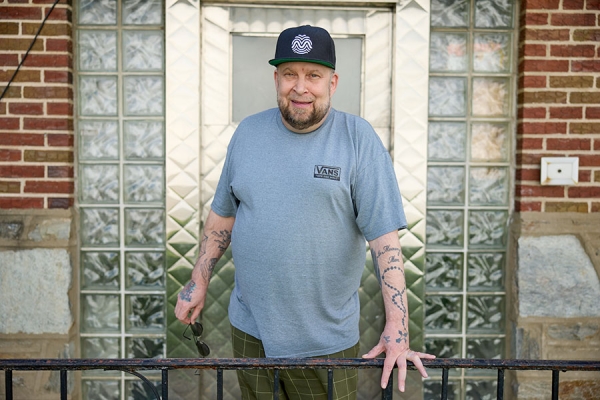Kenneth F. loved his job at a Florida fishing pier. “I got paid to fish. Best job in the world,” says the 50-year-old, who now lives in North Philadelphia. But these days, Kenneth gets too short of breath to work or get around much.
“I can’t walk around the block,” Kenneth says. “If I had to, it would take me 20 minutes because I would have to stop every 20 feet. I also live in a third-floor apartment. By the time I get up there, I am so out of breath and coughing so much. I sleep with oxygen every night. Those are the problems I have from this disease.”
The disease Kenneth refers to is COPD related to alpha-1 antitrypsin deficiency, also called AATD. He’s had AATD all his life, but he only found out about it after he barely survived a life-threatening emergency.
A shocking diagnosis
A few years ago while still living in Florida, Kenneth came home from work one day and began to sweat heavily.
“I was covered in sweat like somebody poured a bucket of water over my head,” he recalls.
Kenneth underwent surgery at his local hospital to repair an aortic dissection (a tear in the main artery that carries blood from the heart). He says surgeons had to revive him twice after his lungs filled with blood and his heart stopped. After recovering from his surgery, Kenneth remained short of breath so he saw a local pulmonologist. Tests revealed emphysema (a type of COPD) and severe AATD.
“I’d never even heard of AATD,” Kenneth says.
AATD is an inherited condition. It happens because the liver doesn’t make enough alpha-1 antitrypsin (a protein) to protect the lungs, which makes them more prone to damage from air pollution, dust, or smoking. As a result, many people who have AATD develop COPD at a young age, such as in their 40s or 50s, as Kenneth did.
Kenneth was the first person in his family to be diagnosed with AATD. He has told other family members about the condition so that they may choose whether to be tested too.
Coming to Temple
After he was diagnosed with COPD, Kenneth was prescribed medicines to help with his breathing, and he quit smoking in 2017. But as his breathing became worse, Kenneth’s doctors in Florida told him that he might eventually need a lung transplant. A family member told him about Temple’s world-class Lung Center, which is a leader in diagnosing and treating lung problems from the common to the complex. Temple also performs more lung transplants than any other transplant center in the U.S. Susceptible to pulmonary related conditions, Kenneth, like so many others, also managed a COVID diagnosis in 2020.
In 2020, Kenneth moved to Philadelphia to be closer to family and to seek care at Temple, including a potential lung transplant in the future. His pulmonologist at the Temple Lung Center, Andrew J. Gangemi, MD, helps Kenneth manage his COPD.
Currently, Kenneth’s treatments include lifelong augmentation therapy, which can slow the progression of lung damage in people with severe AATD by increasing the amount of alpha-1 antitrypsin in their lungs. For this therapy, Kenneth goes to a local infusion center each week to receive a medicine, called prolastin, through an IV. The medicine is derived from alpha-1 antitrypsin protein from healthy donors.
Kenneth is grateful for the medicine. “Without it, I wouldn’t be alive,” he says. But going to an infusion center isn’t convenient, and it limits how long he can be away when he visits family in Florida. Kenneth would like to be able to take a pill to treat his condition instead of getting an IV infusion.
Dr. Gangemi asked Kenneth if he’d be interested in joining a clinical trial at the Temple Lung Center that is testing that option with a drug called alvelestat, and Kenneth agreed. The trial is a double-blind randomized study, meaning participants are randomly chosen to take either a placebo drug or the actual medicine. Neither Kenneth nor the researchers know who is receiving the placebo pill or the active study drug. Kenneth also continues to receive weekly augmentation therapy during the study.
As part of the clinical trial, Kenneth also checks in regularly with the study team at Temple where he undergoes certain tests and exams, including bloodwork and breathing tests.
“I’m doing this study because maybe it will help somebody,” Kenneth says. “If it doesn’t help me, it might help somebody else. If somebody else doesn’t have to get an infusion every week and they can take a pill instead, then I’m happy to do this.”
Leading experts in AATD deficiency
At Temple, Kenneth has met with some of the leading experts in AATD, and they have helped him understand more about how to manage his disease.
One of the experts in AATD at Temple is Friedrich Kueppers, MD, professor of medicine and immunology at the Lewis Katz School of Medicine at Temple University, and lead investigator in the clinical trial Kenneth participates in.
“He knows a lot about alpha-1,” Kenneth says. “I asked him questions about things that have been bothering me for years, and he knows the answers. Like taking a hot shower. Most people say it opens up the lungs. But it really doesn’t. It actually makes it worse. Dr. Kueppers knew that. Only people who know about the disease can know these things.”
